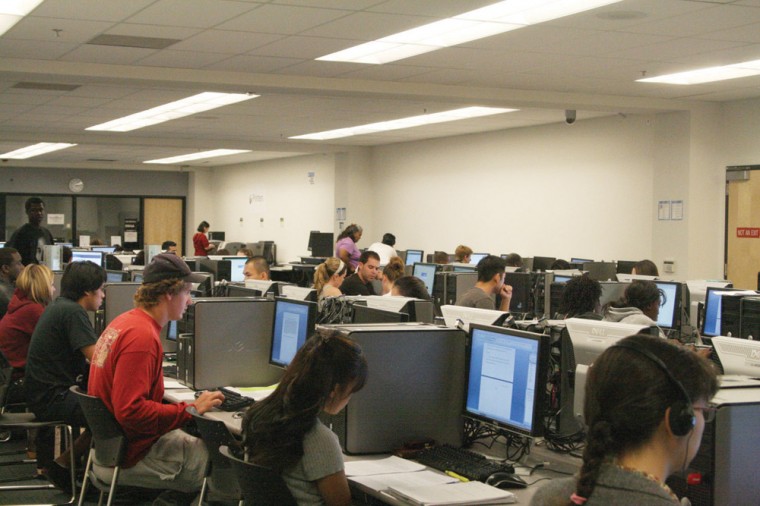AIRC, lounge offers heating and air; increases student attendance
November 2, 2007
The Information Resources and Technology Division worked to create a more comfortable and safe environment at Sacramento State’s 24-hour Hornet Lounge this semester by installing air-conditioning and heating systems and upgrading security systems.
The 24-hour study lounge, located on the second floor of the Academic Information Resource Center, was re-opened on Oct. 1 by IRT. The lounge was previously managed by Computing, Communications and Media Services.
Although CCMS granted Associated Students Inc.’s original 24-hour service proposal, ASI and CCMS could not finance the needed air-conditioning and heating because the extra expenses exceeded the AIRC’s assigned budget.
The lounge’s service became available for the first time last semester, but was not as well received as many had expected because of the air and heating issues.
IRT Vice President and Chief Information Officer Larry Gilbert said ASI approached IRT last month and proposed the lounge be operated on a 24-hour basis again.
Gilbert said last semester’s lack of cooling affected attendance between the hours of 8 a.m. and 5 p.m. during the hotter months of April and May.
He said IRT is in the process of obtaining a commitment from Facilities saying it will “keep the air conditioning and heating system running in the study lounge 24 hours a day.”
He said in order to address payments for the added cost, Facilities will track the extra expense and provide a report to both IRT and ASI by the end of the semester.
Gilbert said in an effort to reduce the overall energy expense, IRT instituted energy management for all IRT computers and computer labs. He said this should partially compensate for the extra expense of operating the AIRC air conditioning and heating systems 24 hours a day.
He said IRT recognized safety concerns associated with the 24-hour service, therefore IRT worked with University Police to develop a security system for all AIRC labs and study areas.
IRT installed security cameras, that are monitored by University Police, in the lounge and are planning to install more in study areas and hallways on other floors of the AIRC building.
IRT also installed wired security systems to all computers and other equipment in the lounge’s computer lab.
Gilbert said the safety concern is primarily in the late night and early morning hours when facility attendance may be sparse.
He said IRT funded the additions, which came to approximately $6,000.
IRT employees provided about 60 hours of labor during design and installation processes.
Gilbert said IRT may ask ASI for help with additional security-related funding, as it was ASI that financed security staffing in the lab last semester.
He said the security system allows IRT to open the computer lab 24 hours a day without the need to incur additional staffing expenses for ASI.
“We’re in testing mode right now, carefully measuring use of the computer lab after hours and monitoring the effectiveness of the new security systems,” he said.
Gilbert said IRT hopes to institute the operation of both a wireless laptop loan program and a Student Technology Center in AIRC this spring.
“Both of these new programs should benefit students and add to the utilization of AIRC by students,” Gilbert said.
He said since the air conditioning and heating issue has been resolved, there has been a larger turnout at the Hornet Lounge.
“I think the 24-hour operation of cooling and heating, plus new security features, will further increase student use of the facility,” he said.
With midterms currently taking place, Gilbert said the Hornet Lounge is heavily used, with 100 percent occupancy most days.
“During midterms and as exams approach, attendance skyrockets in AIRC areas with literally hundreds of students occupying the labs and study areas from early morning until evening hours,” he said.
Associate Vice President for Academic Computing Doug Jackson said he too has noticed a larger turnout in the Hornet Lounge.
“There are hardly any seats available,” he said.
Gilbert said computer lab statistics show there are at least a few students in the lab at all times. He said many students use their own laptop computers and the AIRC’s wireless network to study either alone or in groups, while others use the computers in the 2004 computer lab.
Many students have said they prefer to study at the Hornet Lounge rather than their own home because of its “quiet and less-distracting environment.”
“I can’t focus at home…(I) find a million things to distract me,” said Karina Morales, senior criminal justice major.
Senior business accounting major Wanida Nawab said she prefers to study at the lounge rather than her own home or other campus buildings, especially the library. She said she finds the library distracting because of its dusty environment.
“For somebody who has allergies, the library will just kill them,” she said.
Senior communication studies major Leanne Sandy said although she mostly uses the lounge to study, she sometimes prefers the library because the lounge can get noisy, whereas the library is much quieter.
Nawab studies at the AIRC four to six times a week. She said she has stayed at the facility until as late as 6 a.m.
“I can bring my kid here and sit and study,” she said.
She said she has seen many students study in the lounge all night.
“They bring a pillow and maybe sleep for 30 minutes then study again,” Nawab said.
However, she said the lounge is often overcrowded and should have more tables.
Sophomore undeclared major Zack Eroctor said he too doesn’t like that the lounge can sometimes be overcrowded.
“Sometimes it’s so busy that I can’t even get a computer,” Eroctor said.
While other students prefer the study lounge over their own home, senior biology major Erika Romero said she doesn’t like to study in public places and finds less distractions at her home.
“I prefer to be secluded from everything when I study,” Romero said.
Gilbert said the lounge is not intended for everyone on campus. He said the Hornet Lounge is intended for “drop in” use by students and is not used as a teaching facility, so faculty members have little reason to use the facility.
Other California State University campuses, such as Cal Poly, San Louis Obispo have also implemented 24-hour study services.
Cal Poly freshman business administration major Stephanie Pollard said she lives in the dorms and is unable to study because of the distractions she encounters there. For the same reasons as Nawab and Morales, she prefers to study at her school’s 24-hour facility.
“It’s a lot more peaceful environment, compared to the sometimes chaotic dorms,” Pollard said.
Jesus Andrade, former ASI president, proposed the Hornet Lounge to be open past operating hours at a board meeting last semester. The ASI board of directors collectively agreed and supported his proposal.
“There was a need on campus for something like this,” Andrade said. “I knew the board would definitely support my idea and had the confidence that something like this would get done.”
Evelyn Bigelyaizen can be reached at [email protected].























































































































